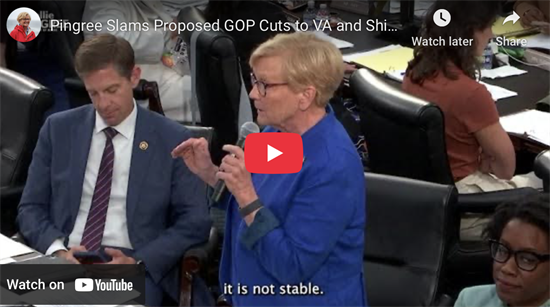Press Releases
WATCH: Pingree Slams Proposed Republican Cuts to VA and Shipyard Resilience During Appropriations Bill Markup
Washington,
June 10, 2025
Today, during the House Appropriations Committee’s markup of the Fiscal Year 2026 Military Construction and Veterans Affairs bill, Congresswoman Chellie Pingree blasted Republicans’ proposed funding cuts, speaking out against glaring issues in the bill, including giving DOGE unfettered access to the VA and ignoring critical resilience efforts for Maine’s public shipyards. A summary of the bill is available here.
Pingree’s full remarks are copied below. Thank you, Mr. Chair. I am extremely disappointed to see the damage to the vital funding for the MilCon-VA bill that is done in this bill before us today. Just to mention a few things. You've heard people talking about the 80,000 proposed staffing cuts [at the VA], which is absolutely a way to move forward to privatizing our veterans’ medical care. This cuts veterans’ and families’ access to reproductive health care and has many more problems that we’ll have a chance to address in our amendments that will be coming soon. But I want to talk about a couple of specific impacts that we will see in Maine. The first one is called Installation Resilience funding—a $30 million cut. Now it's kind of a wonky term, but it will mean a lot to our state. For those of you who don't know, I am blessed to have the Portsmouth Naval Shipyard in my district. Luckily, there's no one in here from New Hampshire, because sometimes they think it's a New Hampshire shipyard. But it’s very clearly in Maine, even if it's called Portsmouth. It is in Kittery, Maine, and it is a vital military facility where we overhaul, repair, and modernize our U.S. Navy's nuclear-powered subs—specifically, the Los Angeles and Virginia class. This shipyard, for you history buffs, was established in 1800, and the first ship they built was a 74 gun warship called the USS Washington in 1814. It was a vital shipyard during World War II, where we constructed 75 submarines and had up to 25,000 people there working every day. Now, I'm very grateful to this committee for consistently investing in upgrades and improvements in the drydock and modernization of facilities there. But you should know that when you build on the coast—any of your coast, my coast, the West coast—it is not stable. And if you were in Maine in 2024, just a year ago in November, we had two severe storms that wiped out about 50% of our working waterfronts. And even this year, there has been some of the greatest sea level surges in the Portsmouth Naval Shipyard recorded in all time. So, what happens then? It risks flooding of our nuclear submarines. You can imagine how expensive and delicate this operation is. This year, they had to use sheets of plywood to keep the dry docks from flooding. The millions and millions of dollars you have invested are now being kept safe with some sheets of plywood. Why would we spend millions of dollars in the SIOP (Shipyard Infrastructure Optimization Project) to modernize these facilities, if we're not going to spend a measly $30 million for resilience funding? It just doesn't make any sense. You know why? Because resilience is one of those prohibited words. Perhaps it’s woke. Perhaps it means climate change. So, for the sake of some prohibited words and things that people think don't actually matter, we are not going to protect our essential investment. Now, as you can imagine, I could go on and on, but I do want to mention one more thing. The staffing cuts that are being proposed, and have already happened, whether it's through the DOGE or the deferred resignation—by the way, that deferred resignation that Elon Musk thought up means that you let people out of their jobs, say, “Go ahead, go home, don't go to work,” but we'll keep paying you till September—and we can't fill those vital positions. So, all those people who thought, huh, maybe I should take the buyout because I might get fired are sitting home wishing they were at work, getting paid. And we are spending the taxpayers’ dollars for people to do nothing. I am lucky to represent a VA clinic. I also have Togus, a medical facility in my district. And I want you to know the number one call that we get from veterans who call in for constituent service—and I know you all do a lot of veterans’ services in your offices, too—is the wait times for VA appointments. It used to be about 17 days, which is a long time to wait, but most recently we heard from a vet who was recently separated and waited 63 days to get to that appointment. You tell me it's not going to get worse if we layoff 80,000 more people. The need is there. These cuts are shameful. The damage we're doing in this bill will be shameful. I'm sorry. I can't support it. And I yield back my time. ### |

